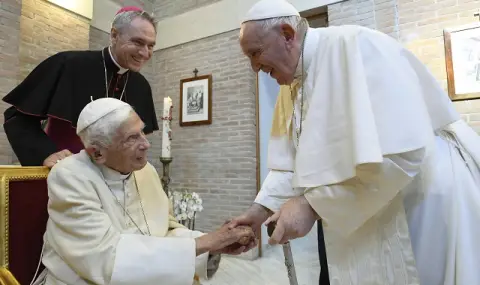With the death of Pope Francis on April 21, the Catholic Church is preparing for a transition that will determine its direction for the foreseeable future. As the first Latin American pope, Francis has brought significant change as bishop of Rome, focusing on social justice, environmental issues and a more inclusive Church, writes Newsweek.
Now the college of cardinals is preparing to gather in the Vatican for a conclave that will determine the future of the Church. Their choice will not just determine the next leader of 1.37 billion Catholics - it will determine the course of the Church's doctrine, transparency and work with the flock.
Will the next pope continue Francis' progressive reforms, or will the cardinals return to theological conservatism? The answer will become clear when the symbolic white smoke rises from the Sistine Chapel.
Francis's influence on the election
The next pope will face a Church shaped by Francis' appointments and reforms. During his tenure, significant structural changes were made, including the decentralization of power in the Vatican and the appointment of more non-European cardinals than under any of his predecessors.
But his style of governance has also left the College of Cardinals in a precarious position. "He elected the majority of the cardinals who had the right to vote," said Ulrich Lehner, a theology professor at the University of Notre Dame.
"However, his approach to governance, characterized by unilateral decisions taken without consulting the college of cardinals, made it impossible to establish interpersonal relationships among them."
A key issue for the conclave will be Francis's response to the sexual abuse scandal, which has divided church leaders. "The most important thing is whether voters can trust that the person they are electing is not a sexual predator who can be exposed?" asks Lechner.
According to Michelle Dillon, dean of the College of Liberal Arts at the University of New Hampshire, “Francis has consistently tried to bring much greater transparency and professionalism to the Curia“. Yet she also noted that some cardinals remain skeptical of his openness to secular engagements, fearing that the Church could lose its unique identity.
How the next pope is chosen
The election of a pope follows centuries-old Vatican traditions. The college of cardinals, made up of those under 80, will vote by secret ballot in the Sistine Chapel.
What is the conclave, the process for electing a new pope?
Who are the leading candidates?
As speculation mounts, several high-ranking cardinals are emerging as the main contenders. According to Vatican watchers and bookmakers, the following candidates have the best chance. Here's a closer look at each of them.
Luis Antonio Tagle (Philippines)
Currently a 3-1 betting favorite, 67-year-old Cardinal Luis Antonio Tagle is considered a strong contender to continue Pope Francis' progressive agenda. Tagle, a proponent of inclusion and evangelization, has significant experience leading the Congregation for the Evangelization of Peoples and is a trusted figure in Francis’ inner circle.
“Overall, I think the fact that, according to my calculations, more than 100 of the eligible papal electors were appointed by Francis could have a major impact on the outcome,” said Cristina Traina, a professor at Northwestern University. "That is, the pendulum may not swing away from Francis' priorities.“
Tagle's Asian background also makes him a compelling choice, as Catholicism on the continent, especially in the Philippines, is growing rapidly.
Pietro Parolin (Italy)
At 4:1 odds, Cardinal Pietro Parolin, 70, is one of the most experienced Vatican officials. As Vatican Secretary of State since 2013, he has played a key role in diplomatic affairs, including delicate negotiations with China and Middle Eastern governments.
Parolin is seen as a moderate candidate, someone who could provide stability while preserving some of Francis' reforms. His deep ties to the Vatican administration make him a strong contender for those who support continuity.
Peter Turkson (Ghana)
The 76-year-old cardinal is now a well-known figure in the Church’s social justice circles, with odds of 5:1 in the betting markets. As the former head of the Dicastery for Promoting Integral Human Development, Turkson has spoken out on issues such as climate change, poverty and economic justice.
Turson’s election will mark a historic moment as the first African pope in centuries. The last African pontiff was Pope Gelasius, who served from 492 to 496. Born in Rome to African parents, Gelasius is known for his extensive theological writings and his strong advocacy of charity and justice for the poor.
Peter Erdő (Hungary)
The leading conservative candidate, Cardinal Peter Erdő, 72, is currently at odds of 6:1. A respected expert in canon law, Erdő is a strong defender of traditional Catholic teachings and doctrines. He previously headed the Council of European Bishops’ Conferences and has emphasized theological orthodoxy (strict adherence to the teachings of the Church).
For those seeking a return to the conservatism of John Paul II and Benedict XVI, Erdő will represent a major departure from Francis’ approach.
Angelo Scola (Italy)
Cardinal Angelo Scola, 82, is a longtime contender for the papacy by an 8-to-1 margin. He was among the frontrunners in the 2013 conclave that ultimately elected Pope Francis. Scola, a former archbishop of Milan, has deep theological roots and appeals to those who favor a more centralized and hierarchical Church.
His traditionalist stance makes him a strong candidate for those who want to move away from Francis’ reforms, but his age could work against him.
What happens next?
A papal conclave usually begins between 15 and 20 days after a pope’s death. This allows for funeral rites, a nine-day period of mourning known as the nomenclature, and time for cardinals from around the world to travel to the Vatican.
Five contenders: Who are the main candidates to succeed Pope Francis?
With the death of Pope Francis on April 21, the Catholic Church is preparing for a transition that will determine its direction for the foreseeable future
Apr 21, 2025 20:53 104
